Digital Poster
Diffusion Reconstruction
ISMRM & ISMRT Annual Meeting & Exhibition • 10-15 May 2025 • Honolulu, Hawai'i

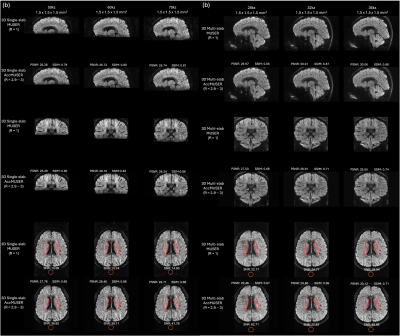 |
Computer Number: 65
4190. 3D
Single-Slab and Multi-Slab DWI Using 3D Accelerated MUSER
(3D-AccMUSER) with Spectrum Analysis and Variable-Density CAIPI
X. Xu, S. Chen, Y. Li, H. Xiong, C. Yuan, T. Liu, N-k Chen,
H-C Chang
The University of Hong Kong, Hong Kong, Hong Kong
Impact: 3D isotropic high-resolution DWI with better SNR
efficiency and clear white matter structure can be robustly
achieved by our method at 1.5T, therefore benefiting the
neuroscience study in evaluating crossing and kissing
fibers.
|
|
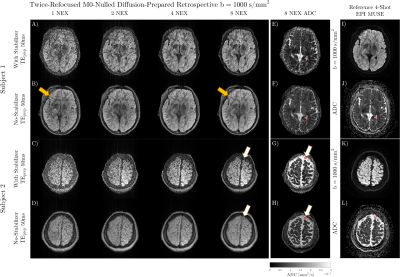 |
Computer Number: 66
4191. High
SNR Efficiency Diffusion-Prepared Imaging with Amplitude
Navigation
P. Lee, X. Zhou, B. Hargreaves
Stanford University, Stanford, United States
Impact: Replacing the stabilizer gradient with use of a
signal amplitude correction in diffusion-prepared imaging
can reliably improve the SNR efficiency in cases where
motion-induced and eddy-current-induced phase is controlled.
|
|
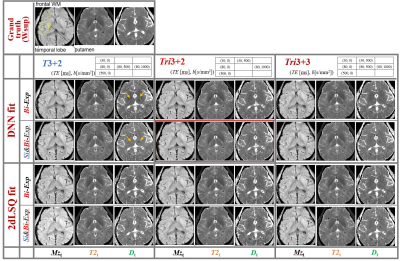 |
Computer Number: 67
4192. Shortening
of Analysis time for T2wsup Synthetic Diffusion imaging
(T2wsup-dMRI) with Deep Neural Network (DNN)
T. Kimura
Shizuoka College of Medicalcare Science, Hamamatsu, Japan
Impact: The analysis time for the 2d LSQ fitting with a
Triangle-pattern in (TE, b)
space was significantly shortened by the DNN while
maintaining comparable REs and CVs. Although further
optimization is required, clinical application is promising.
|
|
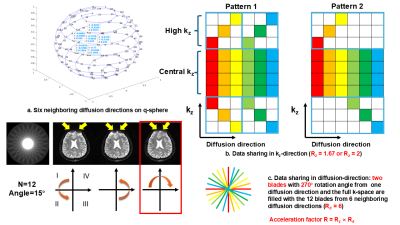 |
Computer Number: 68
4193. High-Resolution
Diffusion Tensor Imaging with 3D Long-Axis PROPELLER-EPI
(3D-LAP-EPI)
S. Chen, H. Xiong, Y. Li, H-C Chang
Multi-Scale Medical Robotics Center, Hong Kong, China
Impact: This study verifies the feasibility of 3D
long-axis PROPELLER-EPI in high-resolution diffusion tensor
imaging enabled by the proposed reconstruction framework and
the highly-accelerated acquisition patterns based on data
sharing along both kz-
and diffusion-direction.
|
|
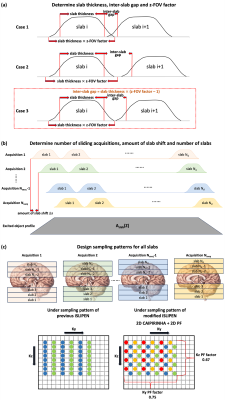 |
Computer Number: 69
4194. Aliasing
Reduction and Resolution Recovery in Accelerated 3D Multi-Slab
DWI with Improved Sliding-Slab Profile Encoding (iSLIPEN)
X. Xu, S. Chen, Y. Li, C. Yuan, H. Xiong, L. Liang, T. Liu,
N-k Chen, H-C Chang
The University of Hong Kong, Hong Kong, Hong Kong
Impact: 3D isotropic high-resolution DWI without
suffering from slab boundary artifacts, loss of resolution
and residual aliasing can be robustly achieved by our
method, therefore benefiting the neuroscience study in
evaluating crossing and kissing fibers.
|
|
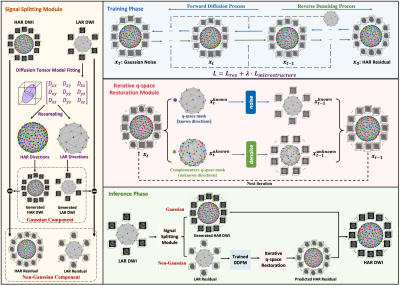 |
Computer Number: 70
4195. Diff2-SRNet:
Super-Resolved Q-space Learning in Diffusion MRI using
Non-Gaussian Residual Conditional Diffusion Model
W. Fan, J. Zou, J. Cheng, R. Wu, M. Nan, S. Wang
Shenzhen Institute of Advanced Technology, Chinese Academy of Sciences, Shenzhen, China
Impact: The proposed method exhibits interpretability
and reliability and shows a high potential to become a
practical tool in a wide range of clinical and
neuroscientific applications.
|
|
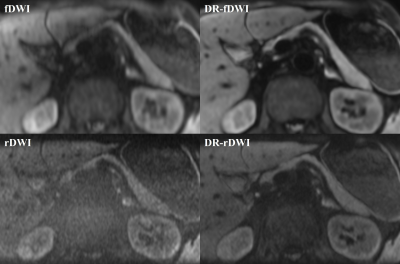 |
Computer Number: 71
4196. Deep
learning reconstruction for improving the image quality of
reduced-field-of-view diffusion-weighted imaging of the pancreas
M. Tanabe, M. Higashi, M. Yamane, T. Yamaguchi, H. Imai, O.
Darwish, K. Ito
Yamaguchi University Graduate School of Medicine, Ube, Japan
Impact: Reduced FOV DWI technique decreases ghosting and
susceptibility artifacts and increases spatial resolution,
but decreases the signal of pancreas. Combination of reduced
FOV DWI technique and DR decreased noise, improved CR
pancreas-fat, and clearly delineated PDACs and NEN.
|
|
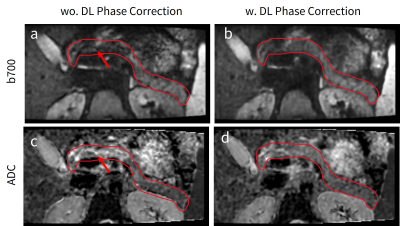 |
Computer Number: 72
4197. Deep
Learning based Phase Correction and Denoising for Accurate ADC
Quantification
X. Wang, P. Lan, K. Wang, A. Zhu, A. Nastaren, A. Guidon
GE Healthcare, Houston, United States
Impact: DLPC with DL denoising allows for a substantial
improvement in ADC quantification compared to current
standard DWI with and without DL Denoising technique. It
will potentially allow wider adoption of ADC as a
quantitative imaging biomarker in body Oncology.
|
|
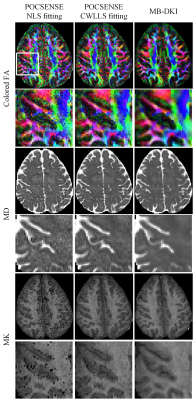 |
Computer Number: 73
4198. Model-based
joint reconstruction for multishot diffusion kurtosis imaging
J. Lyu, W. Zhong, H. Zhao, M. Gao, H. Guo, L. Guo
The First People’s Hospital of Foshan, Foshan, China
Impact: Given the advantages of the proposed method in
experiments with high under-sampled factor, it has clinical
potential for fast high-resolution DKI acquisitions.
|
|
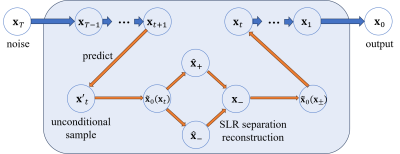 |
Computer Number: 74
4199. Structural
Low-Rank Regularized Diffusion Model for Even-Odd Echo
Separation in EPI Reconstruction
C. Luo, T. Zhao, J. Cheng, G. Chen, Q. Jin, Z-X Cui, D.
Liang
School of Mathematical Sciences, Inner Mongolia University, Hohhot, China
Impact: We propose a diffusion model with Structural
Low-Rank prior that couples odd-even echo acquisition
signals, effectively suppressing eddy artifacts while
reconstructing magnetic resonance images from undersampled
$$$k$$$-space data.
|
|
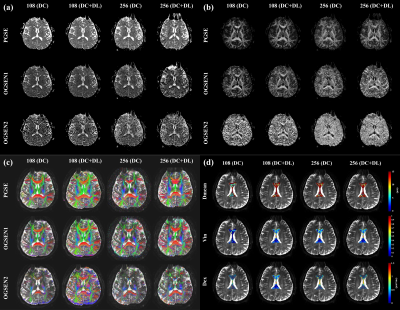 |
Computer Number: 75
4200. Enhancing
OGSE Image Quality Using Deep Learning and Distortion Correction
for the Estimation of Smaller Cellular Structures at 7T
T. Wu, T. Zhang, H. Liang, Y. Xiong, Y. Song, J. Sun, M. Wu,
H. Xing
Sichuan University, Chengdu, China
Impact: This study enables higher-resolution MR imaging
of small cellular structures at 7T using deep learning (DL)
and distortion correction (DC), potentially enhancing
diagnostic capabilities in neurology and oncology, and
encouraging further exploration of microstructural analysis
in clinical practice.
|
|
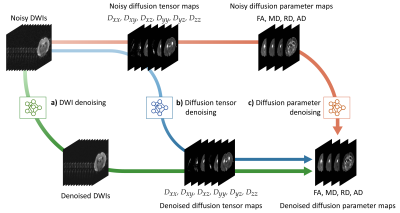 |
Computer Number: 76
4201. Performance
Evaluation of Denoising Deep Neural Network Applied in Different
Diffusion Tensor Image Processing Stages
R. Hong, J. Kim, H. Jeong, R. Virgincar, M. K. Choy, L. Xie,
J. Lee
Seoul National University, Seoul, Korea, Republic of
Impact: This study compares deep learning-powered
denoising methods across different DTI processing stages,
evaluating their effects on DTI analysis. Our findings
suggest that denoising diffusion parameter maps offers the
best outcomes.
|
|
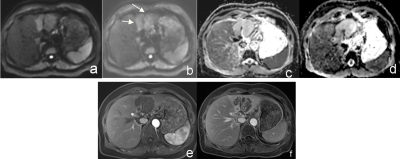 |
Computer Number: 77
4202. Improve
Free-Breathing Liver DWI with Motion Correction and Complex
Averaging
K. Liu, C. Chen, C. Fu, O. Darwish, S. Rao, M. Zeng
Zhongshan Hospital, Fudan University, Shang hai, China
Impact: Advanced processing techniques, including motion
correction and complex averaging, significantly reduce
motion artifacts and enhance image quality in free-breathing
abdominal diffusion imaging. These improvements make it
highly beneficial for adoption in clinical practice.
|
|
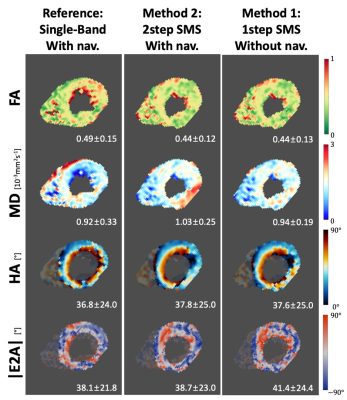 |
Computer Number: 78
4203. Robust
Simultaneous Multi-Slice Diffusion Tensor Cardiovascular MRI
using Referenceless Nyquist Ghost Correction
E. j. Lim, K. Wen, K. Kunze, R. Neji, D. Pennell, P.
Ferreira, J. Park, A. Scott, S. Nielles-Vallespin
Imperial College London, London, United Kingdom
Impact: One-step SMS reconstruction combined with
referenceless EPI phase correction enhances imaging
efficiency while suppressing ghost and leakage artefacts,
enabling a more robust SMS DT-CMR and paving the way for its
clinical translation.
|
|
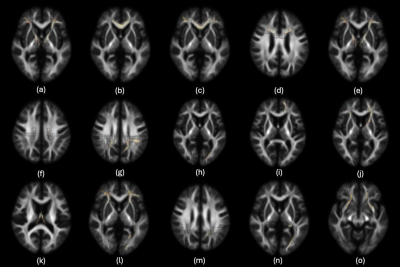 |
Computer Number: 79
4204. Fixel-based
analysis of white matter fiber characteristics and cognitive
dysfunction in Alzheimer’s disease
W. Li, T. Huang, R. Liu, J. Zhu, S. Xu, J. Wang, P. Wang, X.
Liang, J. Zhu, L. Zhang
Duke Kunshan University, Suzhou, China
Impact: This study shows that FBA-measured WM fiber
characteristics correlate with AD severity and cognitive
decline. These metrics may serve as biomarkers for
monitoring disease progression and aiding in the diagnosis
of AD.
|
|
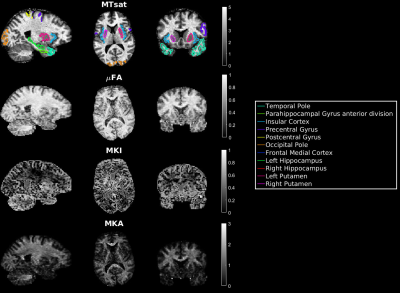 |
Computer Number: 80
4205. Q-space
Trajectory Imaging with tensor-valued diffusion encoding for
clinical usage in temporal lobe epilepsy
J. M. Oeschger, F. J. Fritz, L. J. Edwards, M. Nilsson, F.
Szczepankiewicz, A. Chakwizira, I. Jelescu, Q. Uhl, S.
Mohammadi
Lübeck University, Lübeck, Germany
Impact:
This study helps scientists select more reliable QTI diffusion protocols for TLE imaging, possibly enabling more accurate identification of epileptogenic brain regions for surgical intervention. It is demonstrated that small changes in acquisition parameters can significantly impact parameter estimates.
|
The International Society for Magnetic Resonance in Medicine is accredited by the Accreditation Council for Continuing Medical Education to provide continuing medical education for physicians.